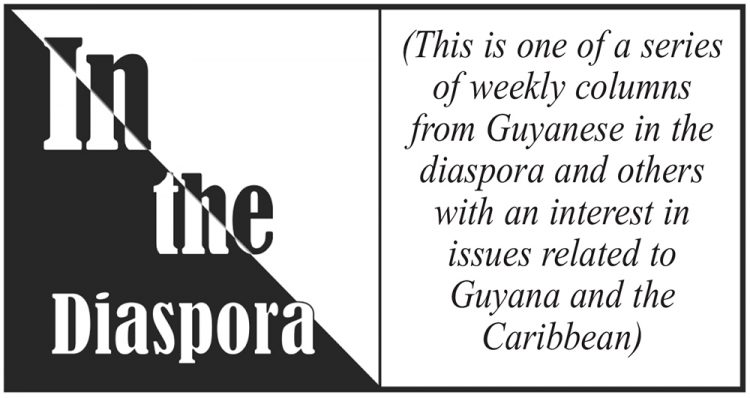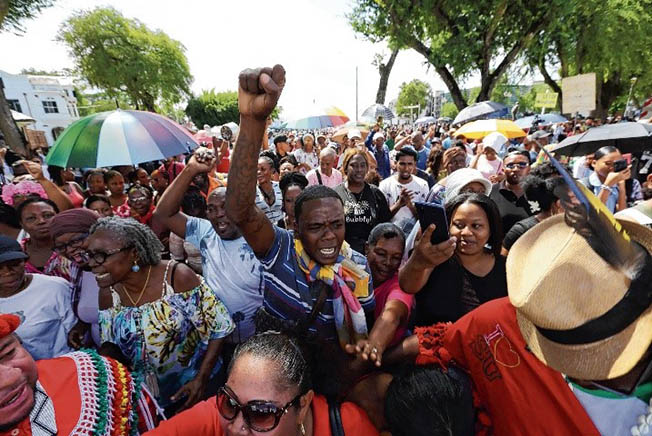By Maggie Schmeitz
Maggie Schmeitz is a Cultural Anthropologist and Women’s and Children’s Rights Activist. Since 1999, she heads Foundation Ultimate Purpose for Sustainable Development, Good Governance, and Gender Equality.
 On Friday February 17, 2023, a peaceful mass protest against the killing cost of living, held on the Independence Square in Paramaribo, turned into a violent confrontation between citizens and armed forces. Shots were heard and tear gas was used to disperse the crowd that included children, elderly, and persons with disabilities. Despite the repeated plea to keep it peaceful by the lead organizer Stephano Biervliet (Stephano Biervliet is a young entrepreneur whose nickname Pakkitow became the brand name for his barbershop and for his production of peanut sauce), a group of protesters stormed Parliament. Simultaneously, fire was set to a historical building, and a mob was looting shops and service stations downtown, leaving entrepreneurs, personnel, and society as a whole, shaken.
On Friday February 17, 2023, a peaceful mass protest against the killing cost of living, held on the Independence Square in Paramaribo, turned into a violent confrontation between citizens and armed forces. Shots were heard and tear gas was used to disperse the crowd that included children, elderly, and persons with disabilities. Despite the repeated plea to keep it peaceful by the lead organizer Stephano Biervliet (Stephano Biervliet is a young entrepreneur whose nickname Pakkitow became the brand name for his barbershop and for his production of peanut sauce), a group of protesters stormed Parliament. Simultaneously, fire was set to a historical building, and a mob was looting shops and service stations downtown, leaving entrepreneurs, personnel, and society as a whole, shaken.
On repeat
On February 17, 2020, Stephano Biervliet organized a peaceful mass meeting against the killing cost of living on the Independence Square in Paramaribo. Only then it was a protest against the Bouterse government II, 3 months before the elections. The ‘regular’ complaints about poverty in a rich country, nepotism and corruption were fueled by the news that the government had used up around 100 million US dollars from the cash reserve of the Central Bank of Suriname for interventions in the foreign exchange market and the import of consumer goods. This involved almost a quarter of the entire bank reserve. The Bankers Association announced that they had been fooled by the government in giving them their cash reserve. Citizens and enterprises were confronted with limited access to their accounts, and threats of having their deposits in foreign currency confiscated. Although the opposition and the trade unions reacted with shock, no action occurred, inspiring Biervliet to apply for a permit for a protest demonstration in a personal capacity. “Our economy has collapsed, many people can hardly make ends meet. So much is going wrong in Suriname. There is corruption, our leaders are enriching themselves. We really need to wake up and take action,” Biervliet was reported as saying.
A new generation of activists
Biervliet (30) is one of a new generation of activists. Young, self-made, and politically independent. Starting with a one man-protest in November 2015, he quickly joined forces with other independent activist Curtis Hofwijks in the initiative group We zijn Moe (We are Tired), with the aim of coordinating the growing resistance against government policy. A group of about 50 persons maintained the protest on a daily basis for 26 days. The government of Bouterse II had won elections again in May 2015. At the end of 2015, prices for water, electricity and fuel had risen nationwide; in 2016, after ongoing depreciation, the Central Bank allowed the Surinamese dollar (SRD) to float. By December 2016, the SRD had lost 46% of its value against the dollar. The depreciation of the SRD, combined with the increases in tariffs on electricity caused domestic prices in Suriname to rise 22.0% year-over-year by December 2017. The group We zijn Moe organized protest demonstrations again in 2016 and 2017, eventually joining forces with other activists like Maisha Neus, Xaviera Jessurun, trade unions and opposition parties. Their ways parted when Hofwijks and Biervliet became part of the new political party PRO; Neus initiated the new political party STREI; and Jessurun started a campaign to ‘vote smart’: cast your vote for the biggest party that will be able to win from Bouterse and his National Democratic Party (NDP), namely the United Reform Party (VHP).
Hope smashed
Elections in 2020 breathed hope for a large part of the population being sick and tired of the corruption and nepotism under Bouterse. The VHP, known as one of the old ethnically based parties (the H in their acronym first stood for Hindustani) seemed to have reformed itself under the new leadership of Chandrikapersad Santokhi, a former Minister of Justice and Police in previous governments. Santokhi did a remarkable job campaigning 3 years ahead of the elections, actively pursuing ethnic diversity within the party. He went to the predominantly black neighborhoods in the city, and to Maroon communities in the interior, to personally convey the party’s message. Suriname saw Maroon, Creole, Javanese and Hindustani youth campaigning together. The VHP campaign was, for the first time in history, a charm offensive towards all ethnic groups, livened up by music from black artists, and with a showing of black candidates on the ballot paper.
Santokhi mimicked some populist tactics from Bouterse; including huge billboards carrying his picture with slogans like: “Chan, your savior’ and “W’o set’en”: We will fix it. Further motivated by the Vote Smart campaign (do not lose your vote on one of the small upcoming parties, but vote for the big party that can beat the NDP), a mass of black voters changed history and voted for the still predominantly Hindustani VHP.
Also for the first time ever, there was an active movement of citizens guarding the physical aspects of the election process, weary about election fraud. Young activists actually tied their hammocks in the sports hall where the boxes filled with ballots were stored to see if there was no foul play.
Elections showed the VHP as the winner with 20 seats, forming a coalition with the predominantly Javanese PL, the predominantly Creole NPS, and the predominantly Maroon ABOP. Bouterse’s NDP had still managed to secure 16 seats.
The VHP would focus on tackling corruption and transparency of public administration, and strengthening of supervisory authorities such as the National Accountancy Service and the National audit Office. During his inaugural address, the new president Chan Santokhi stated that the treasury was empty and that official debts were estimated at SRD 27 billion, probably twice as high assuming a realistic exchange rate. He also addressed the real live situation of the people, detailing the price of foods, medicines and study. The President said that while the situation was very difficult, he was convinced that we are going to solve the crisis, reportedly saying: “I have no doubt about that. I believe in the resilience of our people. I believe in the willingness to make sacrifices. We will solve it if we work together.”
And then, in 2 years’ time, all hope was smashed. The exchange rate soured, prices skyrocketed, and both VHP and ABOP fell back into assigning important political and economic positions to family and friends. Society was confronted with enormous corruption scandals, the most notable one beinga sketchy foreign investment deal that was cancelled after much protest (Surfin), and the near bankruptcy of Surinam Airways, with the top people held accountable being allowed to flee the country.
Theories on the violence of the last protest
Fast forward to the demonstration of February 17, 2023, following mass demonstrations in July and August 2022, with no improvement. On social media a heated debate broke out about who was responsible for the violence. Video material suggests organized infiltrators, and actions happened simultaneously and coordinated. The leader of the protest, Stephano Biervliet (now jailed and awaiting trial), has stated that there were armed people in the crowd who had openly threatened him, with the police not doing anything. Video material also shows shops being looted with police standing by. One theory suggests the government is behind the violence and the looting; they instigated it to create just cause for stricter measurements against protests. Another theory suggests the violence was instigated by followers of the NDP; they instigated it to create further chaos to justify calling for early elections (elections are due in 2025). It seems safe to conclude that there were instigators. But not much was needed to fire the ignition. Disappointment, frustration and despair will make people do things. A hungry mob is an angry mob.
On violence
What always strikes me as ironic is, when the lid of the pressure cooker finally gives way and things erupt in an ugly and violent way, Surinamese people are always quick to say: ‘that is so unlike us’.
It is ironic to me because violence is an integral part of our colonial heritage. Land was stolen from the Indigenous Peoples; enslaved people were stolen from Africa, forced to work on the plantations, kept in captivity; after slavery was abolished, contract laborers from Asia were forced to live and work under horrible conditions and mistreatment. After Independence in 1975, violence continued to occur. The military Coup in 1980, the December Murders in 1982, and the War in the Interior from 1986 to 1992. There is police violence, there is violence in schools, and there is violence in our homes.
Domestic violence is an ongoing pandemic. Studies show that adult perpetrators and survivors of gender-based and domestic violence have been survivors or witnesses of gender-based and domestic violence during their childhood. A recent national study on Violence against Children in Suriname shows that 81% of the children, in the age group 11-18 years, have experienced at least one form of violence in the home.[1] In the years 2015-2022 62 women have been killed by partners or ex-partners.
It seems as if violence is condoned when it goes downwards. As the Uruguayan journalist and writer Eduardo Galeano famously noted, the boss hits the worker, the worker hits his wife, the wife hits the child and the child kicks the dog.
It seems that only when violence goes upwards, we get upset. Instigated or not, the people are tired of broken promises.
Unfair competition and lack of upward mobility
The poverty line has recently been updated to SRD 6000 (an exchange rate of 1 USD: 33 SRD equaling USD 181). The average salary of a civil servant is below this. Entrepreneurs who got hit by Covid-19 and the ongoing spiraling down of the economy, are also facing unfair competition of semi-retired drug dealers money laundering through restaurants, bars, clubs. Politicians also use their position to start up businesses (most obvious in cleaning and security services for government buildings).
For the new generation, upward mobility now seems largely seems to be limited to political connections and crime.
Just like their predecessors, this government has turned to handing out packages. That will not cut it this time.

